Key information
Publication type: General
Contents
7 sections
Introduction
This is the first year we have developed a combined Pay Gap Action Plan in response to our Pay Gap Report 2021. It will address the ethnicity, disability and gender pay gaps. The plan also includes recommendations from our Independent Review commissioned to examine whether there are structural barriers in place that prevent Black, Asian, and Minority Ethnic staff progression at the GLA. You can read the Independent Review here.
The framework used for the plan is the GLA Group Diversity and Inclusion Action Standard. This focuses on actions that organisations can take to achieve a truly diverse workforce, reflective of London; and to develop inclusive cultures in which all can flourish.
The Standard has five sections:
- Diversity Foundations
- Workforce Transparency
- Recruitment
- Career Development and Reward
- Inclusive Culture
Our staff and Staff Networks are key to the progression of our diversity and inclusion work, and integral to the development of this action plan. We ran an online survey for all staff to share their ideas; and held engagement sessions with the staff networks, including the Race Equity Network, the Staff Network for Disability and the Women’s Network. We also had input from Senior Leaders.
This action plan has been endorsed by the Chief Officer who leads the GLA’s Diversity and Inclusion Management Board and oversees all workforce diversity and inclusion activity at the GLA.
1. What progress have we made to date?
We continue to make progress against the commitments previously set out in the GLA’s Ethnicity and Gender Pay Gap Action Plans. Since 2020, highlights of our progress against our action plans include the following.
1.1 Diversity Foundations
- The introduction of Diversity and Inclusion objectives for all staff. These have been embedded as part of our performance review process.
- The revision and updating of five policies within our Work Life Balance and Family policy group to better support working families (maternity; adoption, shared parental leave and pay; birth/adoption support leave and pay; and premature birth and neonatal care).
- Commissioning an independent review to identify and tackle any barriers to career progression for Black, Asian and Minority Ethnic (but particularly Black) staff.
1.2 Workforce Transparency
- Setting new targets to meet the working-age population (16-64) of London by 2024, which is 37 per cent Black, Asian and Minority Ethnic; 49.5 per cent female; and 16 per cent disabled. We benchmark against these targets in our workforce report every six months. We will update them as the population data changes.
- Updating our employee data system so colleagues can self-identify if they consider themselves trans or to have a non-binary gender identity.
- Introducing the monitoring of caring and parenting responsibilities.
1.3 Recruitment
- Giving priority consideration to residents of Newham for jobs that are anchored at new City Hall (a commitment made under section 106 of the planning agreement). Roles are advertised via Newham’s Job Shop – ‘Our Newham Work’ – to all of Newham’s residents.
- We are using our levy transfer allowance (25 per cent) to fund apprentices in London SMEs linked to London’s recovery work.
- We are employing Kickstart work placements to support unemployed young people (aged 16-24) into work. We are also offering supported internships to disabled young people through TfL’s Steps into Work programme.
1.4 Career Progression and Reward
- Reviewing and updating our Learning and Organisational Development framework, as well as expanding our online learning options to give all staff more freedom to independently pursue personal and career development goals through learning.
- Reviewing and relaunching our mentoring scheme, and recruiting and training additional mentors. There is a corporate expectation that all Grade 10+ staff (salary circa £55k+) are available to mentor junior colleagues.
- Sponsoring GLA participants on external development programmes, such as the London Leadership Programme and Leaders Plus, a development programme to help working parents of babies and young children to accelerate their careers.
1.5 Inclusive Culture
- Launching the new workplace adjustments policy, with the aim of promoting greater awareness for staff; and providing additional support and guidance to disabled colleagues and their managers. The policy aims to be as inclusive as possible, removing barriers for any employee to support their health and wellbeing in work. This has been supported by new disability equality e-learning for all staff.
- The corporate roll-out of the Let’s Talk About Race initiative. All senior leaders, and half our people managers, have attended. We will continue to deliver this throughout 2022.
- Delivering Trans Awareness training in partnership with our LGBTQ+ network.
2. Priority actions for 2022-23
Our combined Pay Gap Action Plan will help move us towards a more intersectional approach to closing our pay gaps and addressing inequality. However, we also recognise the specific barriers faced by different groups of staff at the GLA.
We have included five corporate cross-cutting priority actions overall, and priority actions for each of the three groups: race, disability and gender. These have been agreed with our Race Equity Network, the Staff Network for Disability and the Women’s Network. For each priority, we indicate which section of the Diversity & Inclusion Action Standard it relates to.
2.1 Cross-cutting
Progressing our cross-cutting actions should have a positive impact across the ethnicity, disability and gender pay gaps. The priorities are as follows:
2.1.1 Reaffirm the Equality, Diversity and Inclusion (EDI) vision and organisation’s values (Diversity Foundations)
We will reaffirm our EDI Vision and Organisation’s Values by Autumn 2022 and will promote them internally and externally.
This will help us achieve our vision of being an inclusive and anti-racist organisation where people of all backgrounds and characteristics are not only welcome but also able to thrive.
2.1.2 Develop a corporate EDI Strategy (Diversity Foundations)
The Mayor has committed to making London a more inclusive city. EDI is therefore a strategic imperative at the core of the GLA’s mission and purpose.
We will develop a robust EDI Strategy by Autumn 2022 to complement the Mayor’s Inclusive London Strategy. It will bring together existing tools and documents including the Diversity and Inclusion Action Standard; pay gap action plans; workforce reports; and the Dignity at Work policy.
The Strategy will also support staff across the organisation to take responsibility for EDI within their own areas of work; and enable more consistency across Directorate and Unit EDI working groups.
2.1.3 Monitor workforce diversity targets measured against the working-age population of London (Workforce Transparency)
We have an ambition to ensure that the GLA’s workforce is representative of the city that we serve. To help us achieve this we will continue to benchmark against workforce targets to reflect London’s working-age population (16-64); and align with any demographic changes, ensuring representation is as current as possible of London. Presently this equates to a workforce that is 37 per cent Black, Asian, and Minority Ethnic; 49.5 per cent female; and 16 per cent disabled. We will update our targets as the population data changes.
Progress will be reported within our workforce reports every six months. Internally, our targets will be monitored at Directorate and Unit levels, where appropriate, to ensure that all teams play a part in creating a more representative workforce.
2.1.4 Review the GLA’s Recruitment Policy, associated processes and guidance, to embed EDI throughout (Recruitment)
We want to ensure consistency in our approach to recruitment, and to remove barriers, and increase opportunities, for people from Black, Asian, and Minority Ethnic backgrounds; disabled people; and women who have taken career breaks.
We will be reviewing our Recruitment Policy, associated processes and guidance in 2022 to ensure EDI is embedded throughout. This will ensure EDI is a key consideration at all stages and never an afterthought.
2.1.5 Embed robust feedback processes following internal application (Career Progression and Reward)
We will be reviewing our approach to ensure appropriate, helpful and written feedback is provided to staff following an unsuccessful internal application.
The revised process will also present staff with the opportunity to challenge interview feedback. The change will be implemented in 2022, alongside the review of the Recruitment Policy and associated processes.
3. Ethnicity Pay Gap
Our ethnicity pay gap remains the largest of all the pay gaps we examined. As at 31 March 2021, our overall median ethnicity pay gap was 11.1 per cent, and our mean ethnicity pay gap 13.71 per cent.
The median and mean gaps have shrunk since 2017, as well as in the last year (though this decrease was very slight). The highest median and mean ethnicity pay gaps are among Black or Black British staff. As with all other ethnic groups, these gaps have lessened since 2017. After conducting intersectional analysis, it is also clear that the pay gap is greater for Black, Asian and Minority Ethnic male staff compared to Black, Asian and Minority Ethnic female staff.
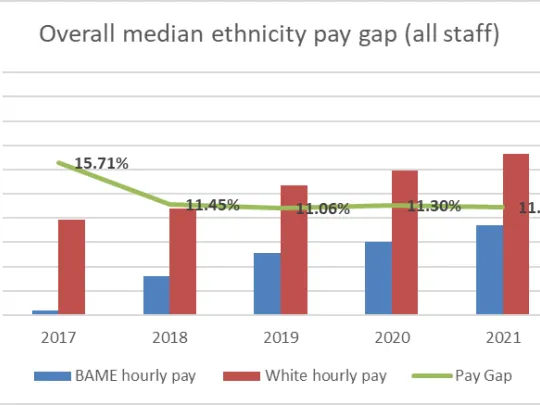
Figure 3.1
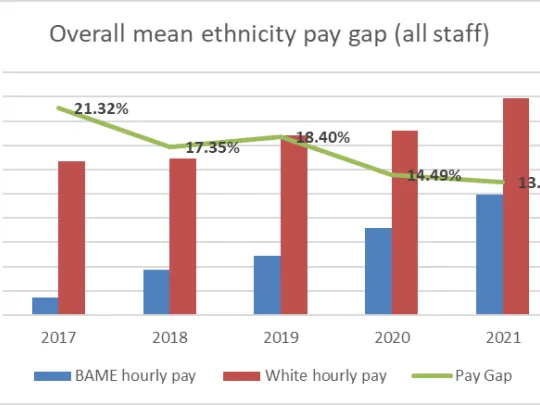
Figure 3.2
We are prioritising closing the ethnicity pay gap, as our data indicates this is where we have the biggest challenge. Our recently commissioned independent review looked at structural barriers in place preventing Black, Asian, and Minority Ethnic (but particularly Black) staff progression. It has provided us with a comprehensive set of recommendations, all of which we accept and will implement by 2024.
We will initially be putting an emphasis on the following:
3.1 Grade 10+ representation (Recruitment / Career Progression and Reward)
We appreciate Black, Asian, and Minority Ethnic staff are under-represented at middle and senior management levels in our organisation (salary circa £55k+). We will take positive action to address this, including ensuring that 30 - 50 per cent of interview candidates are people from Black, Asian, and Minority Ethnic backgrounds for all Grade 8+ (salary circa £45k+) recruitment.
3.2 Build a talent development programme (Career Progression and Reward)
We will introduce a talent development programme targeted at Black, Asian, and Minority Ethnic staff. We will use this programme to prepare Black, Asian and Minority Ethnic staff to take up middle and senior management positions.
There will also be a targeted intervention to support our Black male staff between Grades 3 and 5 (salary circa £28-35k).
3.3 Emotional support (Inclusive Culture)
We want to ensure that our Black, Asian and Minority Ethnic staff are supported at this time of pivotal organisational change. We will work with our Staff Networks, Black Thrive and our Employee Assistance Programme to provide safe spaces for support.
4. Disability Pay Gap
This is the first year we have reported our disability pay gaps. The actions below will help to reduce our pay gaps internally and support our ambitions to become a Disability Confident Employer later this year, ultimately achieving Disability Confident Leader status by 2024. As at 31 March 2021, we had a median disability pay gap of 8.59 per cent and a mean disability pay gap of 8.34 per cent. These gaps are larger than our gender pay gaps, but not as large as our ethnicity pay gaps. After conducting intersectional analysis, it’s clear that disabled women and disabled Black, Asian and Minority Ethnic staff have larger pay gaps than disabled men and disabled White staff respectively.
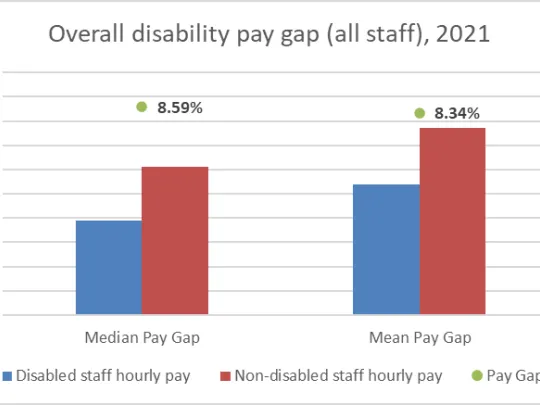
Figure 4.1
The priorities are as follows:
4.1 Implement and monitor the new Workplace Adjustment Policy (Inclusive Culture)
In September 2021, the GLA launched a new Workplace Adjustment Policy following support from Goss Consultancy and in consultation with the Staff Network for Disability and UNISON.
This policy is integral to removing barriers for staff and new employees to GLA. We need to take on board the questions and experiences of disabled staff and managers who use the policy.
As we implement the policy there will be an emphasis on monitoring its effectiveness, which will be captured through staff feedback and team briefings, prior to its annual review in October 2022.
4.2 Review GLA’s Occupational Health provision (Inclusive Culture)
The new Workplace Adjustment Policy and our external Occupational Health service are important mechanisms that we can use to help remove barriers for our staff and new joiners to the organisation.
We will review our Occupational Health provision in 2022, to ensure recognition of, and support for, how workplace barriers can adversely impact disabled staff. We will also ensure staff have a good understanding of the service offer.
4.3 Provide disability training for managers (Inclusive Culture)
In September 2021, we launched the GLA’s first disability awareness e-learning module, designed to support all staff to better understand disability and to work in inclusive ways. We will now expand this learning offer and give managers the knowledge, skills and confidence to lead by example; implement effective workplace adjustments; and provide more accessible and inclusive work opportunities.
Working with Inclusion London, we will develop disability training for managers, to be piloted in Spring 2022. Following a pilot phase, we will roll out training across the GLA’s management community – reaching 90 per cent of managers by 2025.
4.4 Run an internal campaign focusing on disability awareness, equality, inclusive working practice and adjustment provision, including storytelling (Inclusive Culture)
To support all GLA staff to work in more inclusive ways, we will collaborate with our Staff Network for Disability on an internal communications campaign. The campaign will focus on raising awareness of disability, including non-visible disabilities, embedding inclusive working into everyday practice, and implementing workplace adjustments.
We will also work with the Staff Network for Disability and Executive Sponsor to share staff experiences throughout our work and ensure all staff understand the positive impact we can have by removing barriers for staff.
4.5 Increase confidence of staff in sharing disability information via our HR system across all Directorates (Workforce Transparency)
Currently, 7 per cent of our workforce have told us they have a disability. It is likely there are more staff with a disability than is reported and as the GLA have an ambition for our workforce to represent the demographics of the working age population of London. People with a disability are currently 16 per London’s population.
We hope to create a culture in which more employees are confident sharing information with us and understand our reasons for collecting this data. We also want managers and their teams to feel confident in discussing disability and workplace adjustments.
We will run an internal awareness campaign, focusing on staff stories, our rationale for collecting data and how it is used. This will help to highlight the importance of diversity and inclusion in our workplace.
Currently, our analysis is only based on 91 per cent of staff as 9 per cent of have not chosen to share disability information with us. We want to ensure that our data is as accurate as possible to help us understand our pay gaps.
5. Gender Pay Gap
We still have small mean and median gender pay gaps at the GLA. As of 31 March 2021, we had a median gender pay gap of 2.08 per cent and a mean gender pay gap of 4.93 per cent. The gaps have shrunk since 2017, as well as in the last year. However, for part-time staff, the mean and median gender pay gaps have both increased.
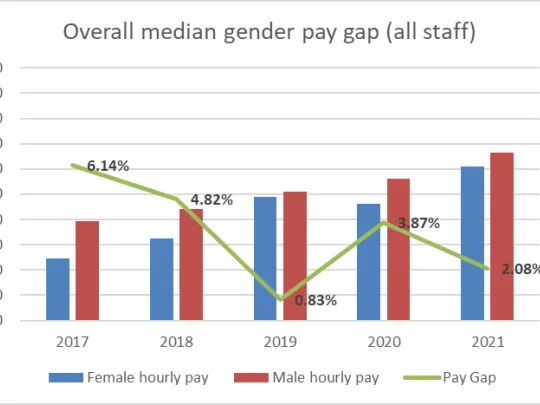
Figure 5.1
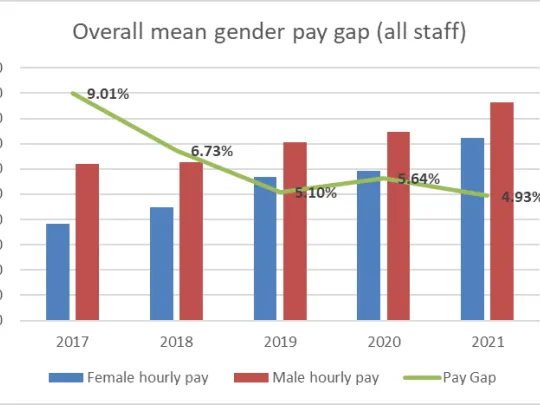
Figure 5.2
The priorities are as follows:
5.1 Implement the new Menopause Policy and launch a new menopause e-learning offer, developed in consultation with the Women’s Network, Unison in line with best practice (Inclusive Culture)
To support staff that experience menopause and their managers, we will implement our new Menopause Policy. Our approach has been shaped by feedback from our Women’s Network and Unison colleagues on the need to better support those experiencing the menopause, which can adversely impact older women. We will engage the Women’s Network, Unison and HR Policy colleagues to ensure clear guidance is available to enable effective and consistent implementation. We will also work with GLA colleagues to roll out and monitor completion rates for a new menopause e-learning offer.
5.2 Achieve an 80 per cent sharing rate for caring and parenting responsibility data across the GLA (Workforce Transparency)
Data is key to understanding our workforce and helps us to develop the right policies to support staff. We already provide caring and dependency leave; and are now asking staff to share if they have caring and/or parenting responsibilities via our HR system. This will help us identify and respond to any barriers encountered by working parents and carers of any gender.
We will attend team and Unit meetings to highlight the importance of sharing and collecting this data and ensure caring and parenting responsibilities are highlighted within our staff storytelling campaigns.
We aim to achieve an 80 per cent sharing rate by 2024.
5.3 Undertake a review of leave policies including an approach to fertility treatment to support working families (Inclusive Culture)
We want to promote a supportive environment where those experiencing fertility treatment feel supported and included by the organisation and their managers. The GLA’s family policies do not currently reference fertility treatment and/or IVF. Our approach will be gender-inclusive, recognising and supporting different models of family.
Working in partnership with the Carers and Parents Network, Women’s Network and LGBTQ+ Network, we will consider our approach to fertility treatment and provide resources and signposting. This will include developing a Managers’ guide to supporting someone undertaking IVF.
5.4 Continue to prioritise engagement on workstreams related to violence against women (Inclusive Culture)
Those who identify as women disproportionately face violence. We have a duty to support and engage with Londoners and our employees to tackle this.
The Mayor’s Violence Against Women and Girls Strategy is a key mayoral commitment. We will ensure staff are engaged with this, building on their own experiences to support them through challenging or distressing circumstances and to enable them to keep well at work.
5.5 Agree Our Time (Cohort 3) timetable across the GLA Group (Career Progression and Reward)
Our Time: Supporting Future Leaders is a mayoral initiative to support more women in the GLA Group into leadership positions, and to help close the gender pay gap. The third cohort of the programme was put on hold due to the pandemic.
We aim to provide opportunities for women who face multiple barriers (e.g., Black, Asian, and Minority Ethnic women; disabled women; and LGBT+ women) to progress through Our Time. We will reserve 50 per cent of the places for Black, Asian and Minority Ethnic women. Disabled women who express interest and meet the minimum criteria for participation will also be fast-tracked to the interview stage of the application.
6. Updates on progress
Updates regarding the GLA’s progress against this plan will be provided at the Diversity and Inclusion Management Board. We will also include updates every six months in the GLA’s Workforce Report, which is reviewed by the London Assembly, available to all staff and published on our website.